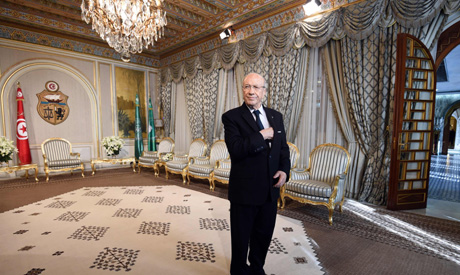
File Photo: Tunisian President Beji Ceid Essebsi stands in his office before an event in Tunis (Photo: AFP)
Tunisia's first freely-elected president, who was selected in the country's first standard presidential elections following the Tunisian revolution, died on Thursday at the age of 92.
Beji Caid Essebsi was a significant figure for the republic of Tunisia ever since becoming the country's fifth president following the fall of Zine El-Abidine Ben Ali in 2011.
Former-president Essebsi was the world's third oldest head of state, after Malaysian leader Mahathir Bin Mohamed and Queen Elizabeth II.
The early life of Beji Caid Essebsi
The Sidi Bou Said-born leader started his political career early on in his life, although he assumed the post of president much later. He studied law in Paris, and his earliest involvement in politics was when he joined the youth organisation under the Tunisian political party Neo Destour.
During his time as a young activist he followed Tunisia's former leader Habib Bourguiba's ideologies shortly before joining him as an adviser when Tunisia became independent from France in 1956.
After briefly serving as Tunisian ambassador in France, Essebsi resigned from the post and returned to Tunisia to work towards greater democracy for his country and continuing his career in law. He later re-entered the world of politics as minister of foreign affairs prior to becoming Tunisian ambassador to West Germany.
Becoming Tunisia's fifth president
Essebsi continued to serve the government in a number of different posts after Bourguiba was overthrown in 1987 by his own appointed Prime Minister Zine El Abidine Ben Ali. After the "Ben Ali stage," Essebsi became interim prime minister, after which he left the office and formed his own political party, the Nidaa Tounes Party, in 2012.
The party's diverse image helped pave Essebsi's way to becoming the president of Tunisia in the 2014 elections.
Women and law
Essebsi was seen as an ideal figure for Tunisian women's rights advocates. He created controversy across the country with his 2017 legal amendments granting equal inheritance rights to men and women. Essebsi also led election reforms and granted Muslim women to right to marry non-Muslim men.
Last few decisions
In April 2019, Essebsi decided he would not pursue a second term in office, saying he wished to give an opportunity to the younger generations.
Short link: